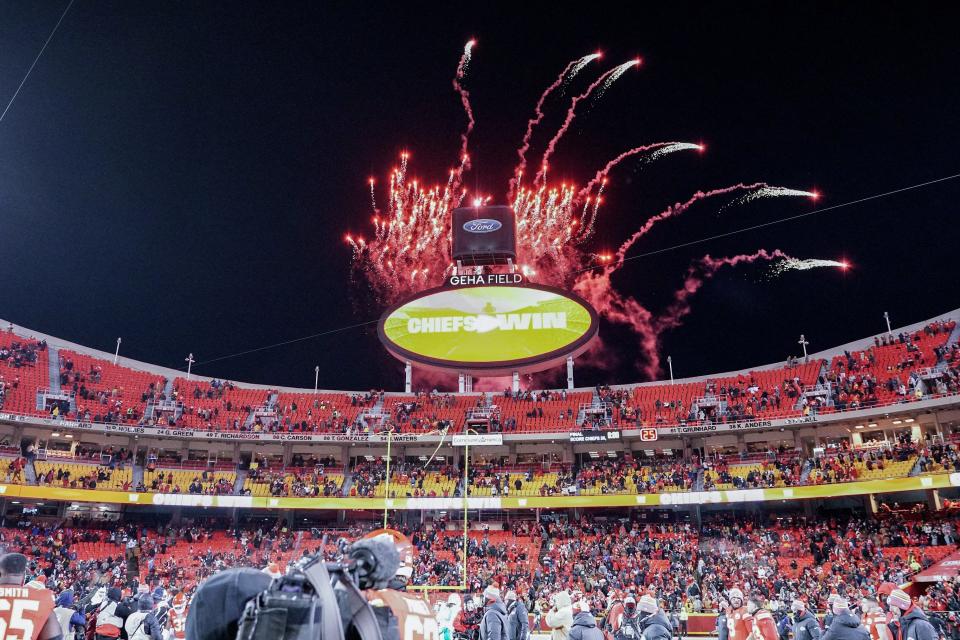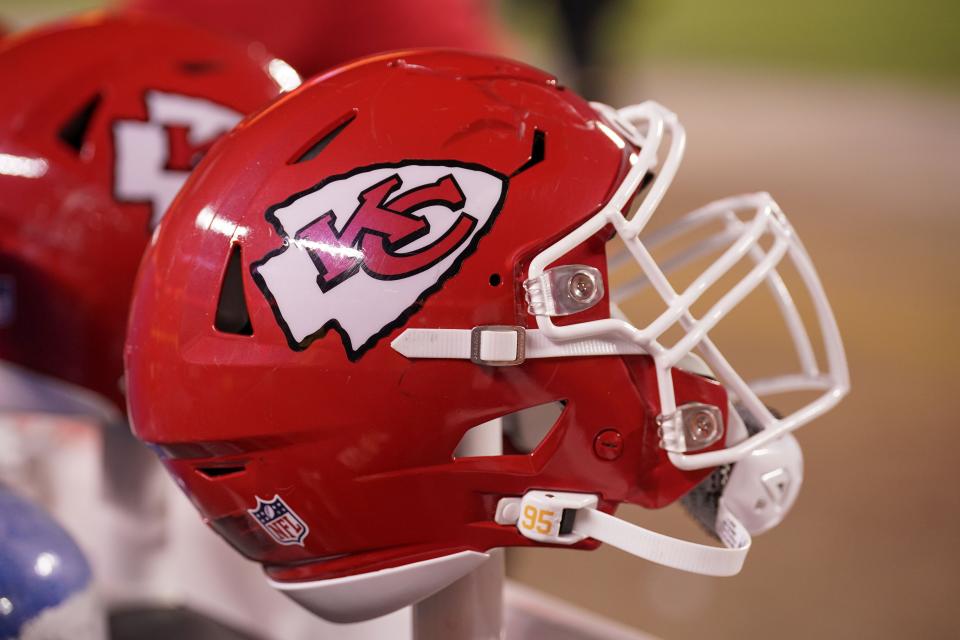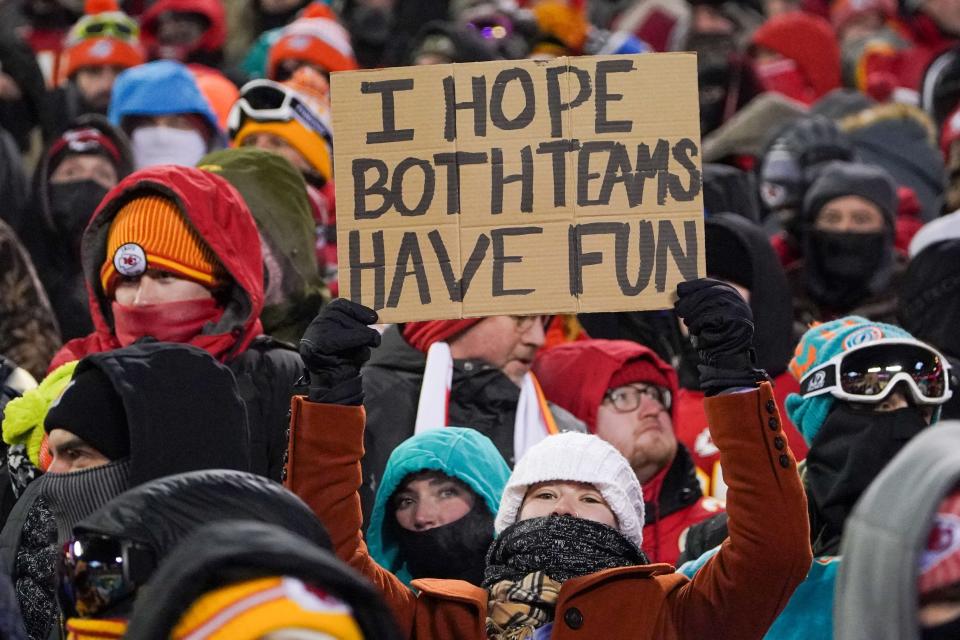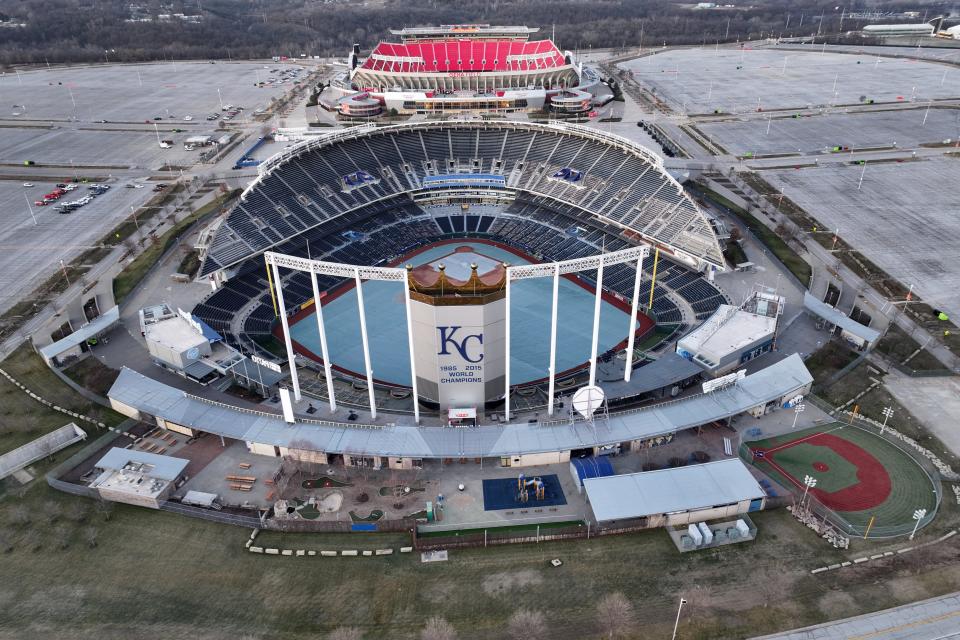How an influence campaign is trying to entice Chiefs to cross the Kansas-Missouri border
- Oops!Something went wrong.Please try again later.
Jackson County, Missouri, voters rejected a proposal to extend a three-eighths cent sales tax for another 25 years to renovate Arrowhead Stadium and build a new baseball stadium for the Royals in downtown Kansas City.
The failed vote prompted immediate interest from the Kansas Statehouse, and lawmakers considered a bill during the final days of veto session in hopes of incentivizing the Chiefs to move across the border.
The hopes hit a snag, however, after lawmakers were unable to gain enough support to override the governor’s veto on a large package of tax cuts that had been a high priority throughout the session. Although the last tax bill had the two-thirds majority needed to override a veto, it was vetoed during the veto session and is considered dead.
Passing a bill designed to lure the Chiefs was seen as bad optics by some lawmakers at a time when tax cuts failed.

Why the fourth-quarter rally now?
Although the attempt in late April to incentivize the Chiefs failed to get a vote, the idea has remained top of mind outside of session. House and Senate leadership say the issue may come up again during the June 18 special session.
On May 30, Kansas Gov. Laura Kelly was spotted dining with Chiefs president Mark Donovan at Verbena, a Prairie Village restaurant. They were joined by a handful of people wearing badges identifying them as employees of the Kansas Department of Commerce.
“Governor Kelly was attending a business recruitment dinner that included leaders from across the KC region," said Grace Hoge, Kelly’s press secretary, later adding it was about economic development opportunities in the state. "This dinner was unrelated to the Chiefs.”
Last year, Kelly said she was “all for” the Chiefs moving to Kansas and didn’t consider it to be a part of the 2019 “Border War Truce,” where Missouri and Kansas agreed to stop offering economic development deals to businesses to lure them across state lines.
The Department of Commerce oversees Sales Tax and Revenue Bonds, commonly referred to as STAR Bonds, which has since been the primary way that lawmakers and advocates have proposed to fund the team moving to Kansas. A bill crafted at the end of the legislative session would have tweaked STAR bonds specifically for a professional sports team.
The following Tuesday, Kansans started receiving texts promoting STAR Bonds to get the Chiefs in Kansas from an organization called Scoop and Score — a term referring to recovering a fumble for a touchdown that Rep. Sean Tarwater, R-Stilwell, used when negotiating the failed bill.
“The Chiefs deserve a permanent home in Kansas City, and the Professional Sports Franchise STAR Bond Project would keep the Chiefs in KC for generations to come — without any new cost to taxpayers,” the text said, while driving them to the website of the organization Scoop and Score.

Scoop and Score
The Scoop and Score website includes a petition that will send a pre-written note to state legislators encouraging them to use STAR Bonds to attract the Chiefs. It also asserts that most Kansans support the Chiefs moving state lines.
The poll, conducted by the company Co/efficient, asserts that 63% of Kansans support the Chiefs moving states, with 20% against it and 16% unsure. It also said that 57% of Kansans approve of STAR Bonds to secure the Chiefs new home, with 27% against and 15% unsure.
The methodology for the poll isn’t public, and Co/efficient is rated 237 out of 277 ranked polling agencies with popular poll aggregator FiveThirtyEight. That ranking includes things unimportant to a private company like Co/efficient like transparency of methodology, but it’s still ranked below average for error and bias.
Scoop and Score formed in mid-May but didn’t make much noise until the mass text campaign on June 4. It ha scores of lobbyists to represent it, 27 in total. It is represented by more than double what any single company was during the 2023 legislative session.
That includes the Chiefs lobbyists, former House Speaker Ron Ryckman and his former legislative chief of staff Paje Resner. Their only other clients besides the Chiefs and Scoop and Score is Polsinelli Law Firm, which is a corporate sponsor of the Chiefs that has represented them in court.
“Scoop and Score’s mission is educating, advocating and marshaling grassroots support for initiatives such as this spectacular economic development and cultural landmark opportunity for our state and region," Ryckman said. "Kansas deserve a voice in this discussion, and they overwhelmingly support securing our state as the permanent home of the Chiefs. The advocacy team was drafted to ensure every legislator has the opportunity to have their questions answered.”
Scoop and Score is a 501(c)(4) corporation, meaning it’s a nonprofit that’s exempt from federal income taxes but isn’t bound by the same rules governing more traditional nonprofit charities that file as 501(c)(3)s. They are allowed to directly participate in politics and advocate for specific policies, and contribute unlimited money. Donors are reported to, but not publicly disclosed by, the Internal Revenue Service.

Kansas lawmakers changing positions on Kansas City Chiefs
The veto session plan to lure the Chiefs didn’t pan out, with many assuming the plan didn’t work due to the optics of providing incentives to businesses before a substantial tax cut bill passed. But since then, lawmakers have come around to the idea.
“The rich tradition and history of the Chiefs are beloved across the entire Kansas City region and throughout Kansas. The potential to establish a home for the Chiefs family here on the Kansas side of the state line is an opportunity that deserves a thorough conversation,” Senate President Ty Masterson, R-Andover, and House Speaker Dan Hawkins, R-Wichita, said in a statement.
The pair said they reached out to the Chiefs to discuss using STAR Bonds as a tool to collaborate and see what “mutually beneficial opportunities might lie ahead” for Kansans and the team. Their letter to the Chiefs confirmed that they’ll consider a Professional Sports Franchise STAR Bond during the special session starting June 18.
The opportunity will only come, though, if a tax bill makes it across the line first, said Carrie Rahfaldt, Hawkins’ chief of staff.
“Delivering broad and sustainable tax relief is still the No. 1 priority as it has been all year,” Rahfaldt said.
Americans for Prosperity-Kansas has been the most vocal opponent of the proposal, both publicly and behind closed doors. Its website includes a template letter to legislators similar to Scoop and Score’s but with the opposite message, calling the plan corporate welfare.
“My question is, what happened to capitalism? What happened to letting billionaires just build their own stadium and not do it off the backs of taxpayers? If they don't take a time out and reassess, they're going to punt tax relief and they're going to leave Kansas fans holding the stadium invoice," said AFP-K legislative director Michael Austin in The Hutchinson Post.

STAR Bonds, a success or failure?
Kansas has been offering STAR Bonds for more than 25 years and a legislative audit found that many of the projects haven’t lived up to the promise of promoting tourism or brought in enough taxes to service the debt in the allotted time frame.
Bonds are purchased by private investors, who then repay them with the sales tax revenues from a business district in and around the proposed development. Traditional STAR Bond financing is limited to 50% of the project cost, must be assessed by the Department of Commerce and the trustee must maintain a debt reserve fund to make up for underperforming sales tax.
But the changes made for the Professional Sports Franchise STAR Bond have proposed up to 100% of projects cost covered by the bonds. A new Chiefs stadium is expected to cost between $2 billion and $3 billion. But the Department of Commerce, as well as proponents of moving the stadium, say taxpayers are never on hook for the bond payments.
In 2021, the Legislature’s auditing arm found only three of 16 projects reviewed met the tourism goals, which STAR Bond critics said is important because it ensures the bonds are paid by new economic activity rather than shifting around dollars that would’ve been spent elsewhere.
But the STAR Bond success stories have been projects that include sports complexes like the Kansas Speedway in Kansas City, Kansas, and the Heartland Motorsports Park in Topeka — which despite meeting STAR Bond metrics is currently being auctioned off after a tax dispute.
Many of the projects have less broad appeal than projects tied to national sports leagues.
“It is patently misleading for someone to compare local projects like a museum in Derby to a regional project like the Kansas Speedway or the proposed Chiefs project. Undoubtedly, an NFL or MLB stadium project will generate more visitors and more revenues than the smaller local projects that also benefit from STAR bonds,” a Scoop and Score document said.
The economics of stadiums don't always add up
STAR Bonds are somewhat unique to Kansas, and only Illinois and Nevada have similar programs but haven’t used them since at least 2010. But the economics of public financing of stadiums has long been considered a losing proposition by most sports economists, despite promises made during the runup to investments.
“There are a lot of people out there that will do what I would consider to be fraudulent research (to support stadium’s moving),” said Daniel Kuester, a sports economist at Kansas State University. “In order to isolate the economic impact of anything, you have to look at the marginal impact that it creates in an area and some of these economic studies will literally assume that everything is going to be this wasteland where nothing happens at all until, in this case, the Chiefs go up.”
The investment is particularly poor for football stadiums, said Holy Cross University sports economist Victor Matheson. Even with the extra games the Chiefs have had during the playoffs in recent years, a handful of college games and maybe even a handful of concerts, there’s simply few events that are hosted at NFL stadiums.
“Obviously we know Taylor Swift has a reason to come to a concert in Kansas City, no matter what side of the river it’s on, but there are not many Taylor Swifts in the world,” Matheson said.
For most teams, the discussions around stadiums moving have long been between distant cities rather than neighboring ones. Matheson said teams were often threatened with possible moves to Los Angeles, which didn’t have a team between 2015 and the return of the Rams in 2016 and the Chargers in 2017.
“Kansas City has the wild misfortune of lying right on a state line and so you can have businesses play two states off against one another. And you have politicians with egos and it’s easy to move from one place to another,” Matheson said. “It’s fine for the fans, because at least it looks like (Chiefs CEO Clark) Hunt is pretty committed to the Kansas City market.”
Kansas City Mayor Quinton Lucas, who supported the failed sales tax extension, has maintained that he's working to keep the Chiefs in Kansas City.
Missouri Gov. Mike Parson has said he'll do what he can to retain the Chiefs. Parson said he's unconcerned about the prospect of the current Chiefs' negotiations with Kansas, last week telling KFVS it is "a lot of talk."

Royals now playing ball
The Kansas City Royals lobbied for a downtown Kansas City, Missouri, stadium during the Jackson County vote but now seem to be in play for Kansas as well. On Monday, legislators and Wyandotte County officials met to discuss bringing the Royals across state lines in a similar way they’ve considered courting the Chiefs.
Hawkins confirmed the legislator is interested in talking to the Royals on a Monday morning appearance on Kansas City Talk Radio’s the Pete Mundo Show. He said the proposal would always include the Royals but had been excluded from the conversation over a perceived lack of interest from the MLB team.
“The Royals hadn’t really shown any interest. The Royals were focused on downtown Kansas City, Missouri, and maybe another area north of downtown,” Hawkins told Mundo.
The Royals have so far attracted eight lobbyists to represent their interests to the Kansas Legislature.
This article originally appeared on Topeka Capital-Journal: Kansas lawmakers hope to court KC Chiefs during special session

